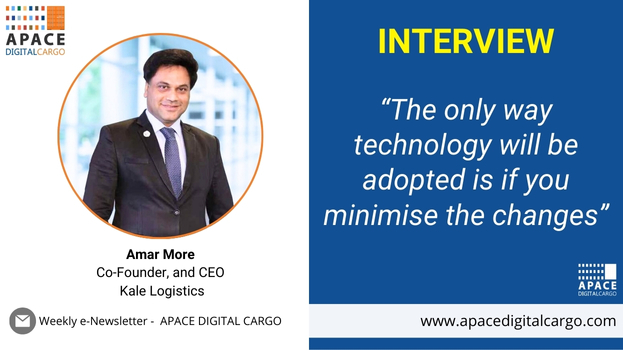
Amar More, Co-Founder, and CEO of Kale Logistics, in an interview with Jasleen Kaur of Apace Digital Cargo shares insights about how digitalisation and use of Artificial Intelligence are reshaping the air cargo industry. His mantra is simple – “Keep it Simple” to bring in more efficiency and elevate the customer experience. In this interesting and insightful interview, he stated, “The only way technology will be adopted is if you minimise the changes”.
To begin with, how do you see the role of technology in the cargo industry?
In the last two to three years, the concept of single window system, cargo community systems – is gathering tremendous space globally. Whether it is the International Civil Aviation Organisation or the United Nationals, everybody is adapting such systems, which definitely is going to add a lot of value towards inefficiencies, reducing paperwork, and obviously bringing in more transparency.
So, as Kale ourselves, we have signed up with airports and ports across 38 countries to develop these kinds of platforms. Now, I have also seen that we have been doing a lot of things in artificial intelligence. It is providing a lot of value into customer service, creating different chat boards for cargo companies. We have also seen AI adding values to the truck slots management, dock management system, etc.
We feel that AI is definitely changing the way the industry has been working so far. And before offering AI to our customers, we are using it for our own purposes.
With the adoption of AI and other digital trends, what are the plans and strategy of Kale for the Indian market or overall?
As Kale, we have already started building a lot of use cases of artificial intelligence into our cargo community system. Whether it is about the airway bill information, processing it to UCR or just working on a lot of data in the past and predicting the truck dwell times, turnaround times, etc; – we are building all of these functionalities into our product. And, that’s really changing the way for our customers, those who are operating in those spaces.
Even as Kale, we are using it internally also for our software development activities. We are also providing a lot of automated test cases, etc. So, use cases of artificial intelligence in our product is the way we are going about it and we are going to use it for our internal activities.
How do you see the adaptation of these in the Indian freight forwarding community?
The key principle is always “Keep it simple,Stupid!”. So, if you create technology, if you want it to be adopted, then it should not cause a lot of change to the users of the system.
If I go to the airline and say, you have to develop this big functionality to your product, we use this technology. They will say, run away. Or if I go to a freight forwarder and say, you can invest lakhs of rupees into creating this; they are not going to work. So, the only way technology will be adopted is if you minimise the changes that are required for the users of the system to use your platform.
And, I can now very confidently say that after almost a decade of working with small to medium size freight forwarders in different geographies, we have understood this formula. And, as I said, it’s keeping it simple, keeping it easy!
You mentioned geographies. What are the markets you are looking at?
Right now, we have got customers from the northwest corner of the world, which is Alaska; from Anchorage Airport to Osaka in Japan, and from Norway to South Africa. We realise that whatever technology we have developed, is accepted globally. So, right now, it’s limited by whom we can reach out to, rather than thinking of which market will accept this or not. As I said, we have 5,000 customers across 38 countries, and we have also expanded our operations. Our own people are now positioned in 11 countries in the world. The strategy is to go global. We already have a global customer base.
How do you use the competitive scenario?
It will be foolish to say that we have no competitors. There is competition for parts which we have developed. For example, our cargo community system caters to exporters-importers, freight forwarders, truckers, airlines, ground handlers, customs and other regulatory agencies. We have competition in specific areas. Let’s say from airlines to customs, there will be a couple of competitors. From freight forwarder to end, there will be a couple of competitors. But, from the whole platform that we have developed, I will be a little arrogant to say that we have no competitors.
Of course, it is foolish to think that competition won’t come because the other people can also develop something, but at least for the next three years, we don’t see equal companies using the whole area in terms of competition. But, as I said, competition exists for different portions of what we have developed.





